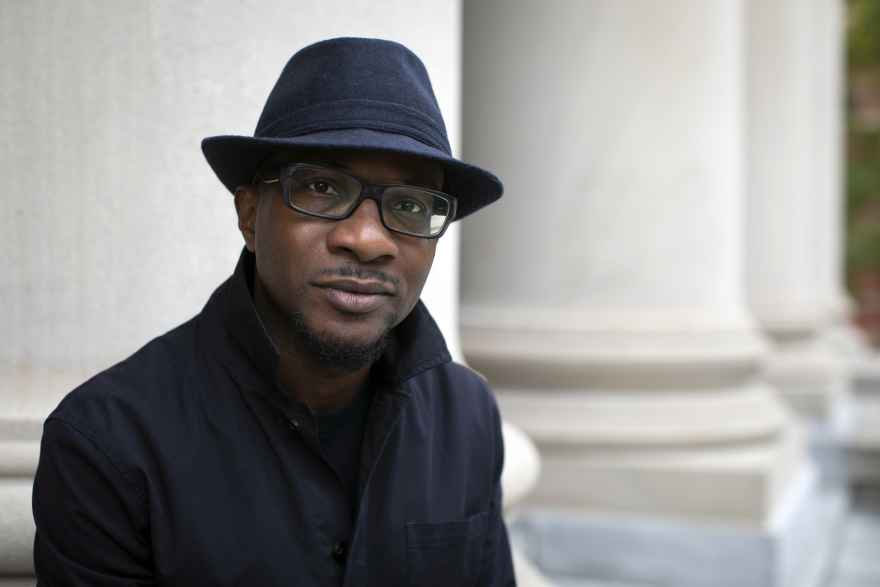Author and Photographer Teju Cole to Deliver a Series of Talks at UChicago

Teju Cole feels a sense of responsibility in coming to the University of Chicago this spring for the 2019 Randy L. and Melvin R. Berlin Family Lectures. Not only does the acclaimed author, photographer, and critic appreciate the opportunity to speak, he relishes the sustained, serious engagement he’ll receive from the audience and UChicago community.
Beginning on April 8 and continuing on April 15 and 22, Cole will explore what it means to be a sensing being through experience, epiphany, and ethics. Registration for the series, which will be held from 6 to 7:30 p.m. in the Logan Center Performance Hall, is free and open to the public. His first lecture centered on experience can be viewed now.
“For the past year, I’ve thought about what I want to say to this intellectually engaged audience,” said Cole, the Gore Vidal Professor of the Practice of Creative Writing at Harvard University and the photography critic of The New York Times Magazine. “I’ve had this idea for a long time, that people at the University of Chicago deeply care about philosophy, history, literature, and art. These lectures provide me with the forum to discuss urgent concerns with what I believe will be an ideal audience. I’ll be talking about how our senses can help us to understand the lives of others, and how they can help us recognize the mutual and unshirkable responsibilities that bind all human beings.
“It is the responsibility of a writer to supply the language for our predicament.”
Since 2013, the Randy L. and Melvin R. Berlin Family Lectures bring leading scholars, writers, and creative artists from around the world to the University of Chicago for an annual series of lectures to be published by the University of Chicago Press. Past speakers have includes architect Jeanne Gang, Nobel laureate Mario Vargas Llosa, award-winning author Amitav Ghosh, and Harvard scholar Lawrence Lessig.
In this edited Q&A, Cole discusses how his artistry in writing and photography has progressed, and how literature tells us more about the human condition and is woven into our experience of the world.
Question: How did you develop your talents in photography, fiction, and nonfiction?
Answer: I ended up focusing on the areas that could be the most productive for me. I took a deep dive into the world that most interested me and learned everything I could in writing, photography, criticism, and teaching. While these interests started independently, over the years, one path led to another. Now these pursuits are part of my work and bleed into each other. It’s been a tremendous privilege.
Q: Your book, Blind Spot (2017), incorporates both your photography and prose. How do your skills in photography help enhance your writing?
A: When I take a photograph or write a book, I try to see something that I haven’t seen before. When I press the camera’s shutter, I know how the camera works. That is similar to opening my computer to write. The technical aspect is not the difficulty here.
To move beyond the technical aspect and to create work that is worthwhile, an artist has to have a certain presence of mind. Call it seriousness. As I have gotten older, I have learned not to be ashamed of being serious. The world is worth our seriousness. I want to bring the necessary intensity of focus to everything I do, and in that way make it worth doing.
Q: What about being a photography critic helps develop your own skills as a photographer?
A: It allows me to be tougher in editing my own photographs. It also helps me to feel part of a family of photographers.
Additionally, intellect plays an intriguing role in making images. When I take photographs, the way that I think as a writer is reflected in my images. These are a writer’s photographs, a peculiarity I embrace.
Q: Does your teaching of students make your creative work harder or easier?
A: It makes it harder in some ways because teaching is intense and all absorbing. On the other hand, I see what works and doesn’t work in the writing of my students. I tell them to make their writing simple. And I apply what I’ve told my students to my own writing. As a result, teaching writing improves my own prose.
Q: Who are a few of the people who have inspired your own work?
A: I think of John Berger, who developed the 1972 BBC TV series “Ways of Seeing,” which taught me that photographs always require a narrative to make sense. Also his sense of political engagement intrigues me.
Due to our current political predicament of increasing nationalism, dramatic income disparity, and the unsolved problem of racial inequality, Simone Weil’s work is very often on my mind. She wrote, “Attention, taken to its highest degree, is the same thing as prayer,” which is an instinct that I would happily embrace as a personal manifesto.
The literature of Toni Morrison also inspires my work. She is a sublime artist who speaks to the general complications of the human condition, but who does so with astonishing specificity. I find that I rely on her more and more. Her work vibrates beyond what is written on the page and gives our lives more meaning.
Q: What is different about the Berlin Family Lectures compared to other presentations you have given?
A: I have never delivered a three-hour lecture over the course of three consecutive weeks. UChicago has a well-earned reputation for fostering intellectually engaging spaces, which is shorthand for saying that truly serious thinking happens here. What a joy to be able to make a small contribution of my own to that tradition.
RSVP today for the 2019 Berlin Family Lectures with Teju Cole: April 8, April 15, and April 22.